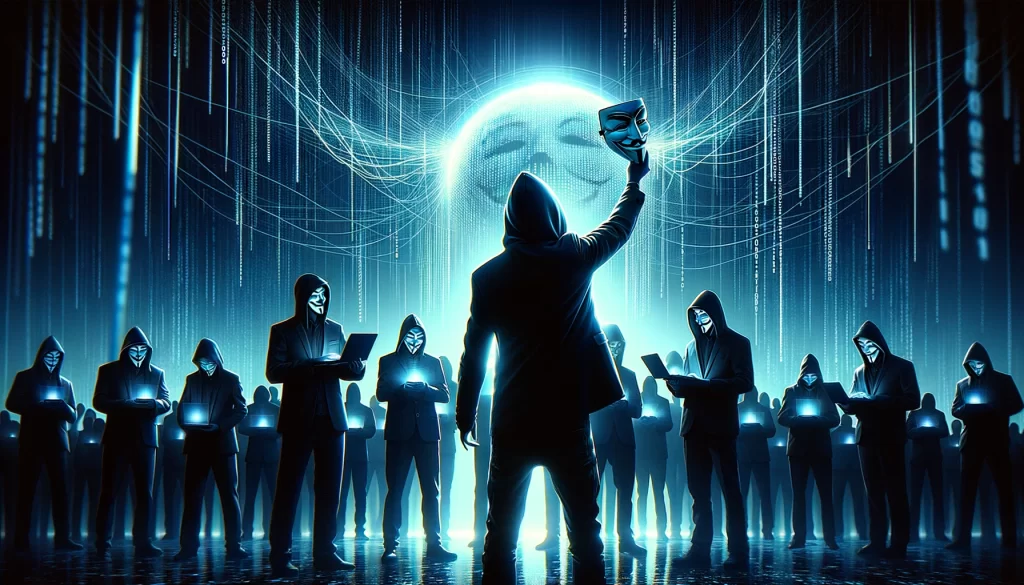The enigmatic entity known as Anonymous has evolved from its humble beginnings into a globally recognized collective, characterized by its members’ distinctive use of Guy Fawkes masks and its involvement in a myriad of digital and real-world protests. Tracing its origins and understanding its transformation into a symbol of digital activism offers a compelling glimpse into the dynamics of online communities and their impact on society.

Origins in the Primordial Digital Chaos
Anonymous sprouted from the chaotic landscape of 4chan, an imageboard website launched in 2003 by Christopher Poole, also known by his pseudonym “moot”. 4chan was originally created for discussing Japanese comics and anime but quickly expanded its thematic reach. It was characterized by its complete anonymity; users could post without a name or any identifying mark, which was a relatively novel concept at the time. This anonymity was the soil from which the collective that would come to be known as Anonymous grew.
A Culture of Anonymity and Mischief
The early activities of Anonymous were not particularly noble or politically motivated. The group’s initial actions were often pranks, known as “raids”, on other online communities and websites. These raids were sometimes simple practical jokes but could also veer into more harmful territory, such as harassment or distributed denial-of-service (DDoS) attacks, where a website is overwhelmed with traffic and forced offline.
One of the first significant actions credited to Anonymous was the 2008 project Chanology, a protest against the Church of Scientology. The church had attempted to remove a video of Tom Cruise discussing Scientology from the internet, which Anonymous saw as censorship. This led to a series of protests, both online and in the real world, marking a shift towards more serious and focused activism. Protesters donned the now-iconic Guy Fawkes masks, inspired by the graphic novel and film “V for Vendetta”, symbolizing their unity and anonymity.
Evolution into Digital Activism
Following Project Chanology, Anonymous’ activities took on a more pronounced political edge. The collective began to involve itself in various global causes, from supporting the Arab Spring protests in 2010 and 2011 to exposing child pornography networks. Their tactics varied from hacking government websites to leaking sensitive documents and coordinating DDoS attacks against institutions they perceived as corrupt or unethical.
This period marked the transformation of Anonymous from a loosely organized prankster group into a decentralized network of activists. The collective’s nature meant that it had no official membership or hierarchy, and its goals and methods could vary widely depending on the individuals involved in any given action.
Challenges and Criticisms
The anonymity and lack of formal structure that define Anonymous also pose significant challenges. The collective has faced criticism for the collateral damage caused by its actions, including the impact on innocent bystanders during leaks or cyber-attacks. Moreover, the lack of accountability and the potential for individuals to act in its name without consensus have raised questions about the ethics and effectiveness of its methods.
Despite these challenges, Anonymous has had a undeniable impact on both the digital and real-world stages. It has brought attention to issues of privacy, freedom of speech, and corruption, and has acted as a catalyst for online and offline activism. However, the debate about the morality and consequences of its actions continues to evolve.
Legacy and Continuing Influence
Today, Anonymous remains a potent symbol of resistance against oppression, censorship, and injustice, albeit a controversial one. Its legacy is reflected in the ongoing debates about digital privacy, the power of internet communities, and the ethics of hacktivism. The collective’s influence extends beyond its direct actions, inspiring other groups and individuals to take up digital activism and fight for their causes in the ever-complex digital age.
In conclusion, the story of Anonymous is a testament to the power of collective action in the digital era. From its origins on a chaotic internet forum to its role as a major player in global activism, Anonymous exemplifies the potential for anonymity to serve as both a shield and a weapon in the fight for justice and transparency. As the digital landscape continues to evolve, so too will the nature of digital activism, with Anonymous forever etched into its history as a pioneer of this modern form of dissent.